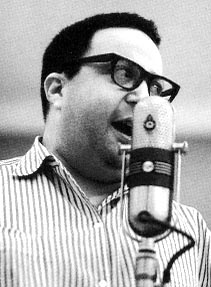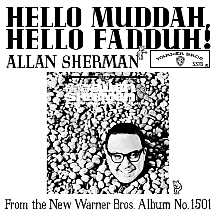ALLAN SHERMAN
Hello Muddah, Hello Fadduh!
By the time "overnight" success arrived in the fall of 1962 for 37-year-old Allan Sherman, he'd spent about ten years attempting to get into showbiz followed by another decade past the foot-in-the-door stage as co-creator and producer of I've Got a Secret (the long-running prime time game show that debuted in 1952 on CBS) before moving on to other television projects including a disastrous days-long stint on the staff of Steve ("Smock! Smock!") Allen's syndicated talk show in 1961. For years he'd been writing parodies of established hit songs, usually giving the lyrics a Jewish twist, often singing them for guffawing friends at parties. Struggling to make ends meet with a wife and two children to support, he mustered the chutzpah to send some of his funny songs around to record labels. Many rejections followed until Warner Bros. bigwigs decided the songs might connect with more than just a narrow ethnic segment of Americans.
One evening in August '62, My Son, the Folk Singer was recorded with musical arranger Lou Busch before an invitation-only audience treated to witty spoofs like "My Zelda" (previously known as "Matilda," made popular by Harry Belafonte) and the album's most popular track, "Sarah Jackman" ('...how's by you?'), a duet with actress and singer Christine Nelson contributing to Allan's modern phone call version of the French nursery rhyme "Frère Jacques." Any concerns about the music's limited appeal disappeared; Warner couldn't stock records in stores fast enough. The album shot to number one within weeks of release and had reached the million mark in sales by December.
Much had happened to Chicago-born Allan Copelon before he so suddenly became the king of comedic song skewering (a distinction he has, perhaps, yet to relinquish). He was often on the move during his childhood, from Chi to L.A., then to N.Y. to live with relatives at age eight when his parents split up, zig-zagging between coasts and/or Great Lakes every couple of years, attending high school in Miami and finally graduating from Fairfax High in Los Angeles. Numerous poems and satiric songs were inscribed on scrap paper...were they meaningless exercises or million dollar ideas? He got away with being a "class clown" through grade 12, but a similar, ramped-up irreverence got him kicked out of college...so in 1945 he married his lovely, ultimately long-suffering motek, Dee Chackes, moved to New York and set out to dazzle Broadway with his authoring skills. The Golden Touch was a stage play set in a delicatessen...and more than that we may never know, since purported producers absconded with the project's funds before it got off the ground.
Sherman's first recording was released in 1951 on Jubilee; "A Satchel and a Seck" was a limited-appeal parody of "A Bushel and a Peck" (as in 'I love you...,' a hit some months earlier for Perry Como and Betty Hutton, Doris Day and a few other singing gentiles). Former child star Sylvia Froos joined him; they were billed as Soeurele the Chanteuse and Eln Shoyman and few got the joke...or even heard the song. Then I've Got a Secret catapulted Allan out of the stage musical mindset into the less lifelike but more accessible world of the B&W 12-inch home screen explosion of the early '50s. Several years later he was fired from the high-rated series he'd had a hand in conceiving (via the inspiration of earlier panel show What's My Line?). In '61 he signed on to produce The New Steve Allen Show, a syndicated counterpart to Steve's groundbreaking mid-'50s Tonight Show turn. Someone with the power to veto bespectacled Steve decided overweight Allan wasn't right for the show; Sherman was shown the door within the first few weeks.
What followed was a hit-and-mostly-miss process of trying to sell his song parodies (still somewhat uncharted territory in '60s comedy circles) to music publishers and record labels. Once Allan Sherman's Mother Presents My Son, the Folk Singer (full title!) became the must-have party record of 1962, the question surfaced: would it be a one-shot? The answer came quickly. My Son, the Celebrity hit stores at year's end, chock full of meshugganah sequels to the debut album's selections. "Al 'n Yetta" (based on another French song, "Alouette") and "Harvey and Sheila" (easy one: it's "Hava Nagila"...even Jewish songs were fair game for mockery!) had adults, and a growing number of adolescents, hysterically rolling on the floor.
Sherman called himself "The worst singer in the world." Millions disagreed! President John F. Kennedy, a big fan of Allan's "Oh Boy" (usually pronounced "uhhb-buoy!") brand of humor, was caught more than once humming "Sarah Jackman" and other My Son songs in the White House hallways. Celebrity (proudly presented by mother this time), recorded at Allan's 38th birthday party on November 30, its cover featuring wife Dee, their two children, pet beagle (who once buried a bagel), his maid and her husband (driving Allan's Lincoln), hit number one in March '63, while My Son, the Folk Singer was Grammy-nominated for Album of the Year and Sherman nabbed a nom for Best New Artist. He embarked on a nationwide tour, playing for S.R.O. crowds. Then he penned a tune about a boy stuck in a catastrophic summer camp situation.
'Hello muddah, hello fadduh...here I am at Camp Granada...camp is very entertaining...and they say we'll have some fun if it stops raining.' Thus begins the crowd-pleasing song that was on everyone's lips (youngsters, especially) in the summer of 1963. Some fun...kids were gettin' 'poison ivy' and 'ptomaine poisoning' and 'malaria' at this "resort"...and 'the lake has alligators'???...all set to the tune of Amilcare Ponchielli's "Dance of the Hours," which hasn't been the same since. Good line for a big laugh: 'You remember Jeffrey Hardy?...They're about to organize a searching party!' An instant sensation, "Hello Muddah, Hello Fadduh (A Letter From Camp)" hit number two on Billboard's Hot 100 (unable to dislodge Little Stevie Wonder's "Fingertips" or The Angels' "My Boyfriend's Back") but triumphed at the top of the comparable Cash Box singles survey, late August. No need for Mom to recommend the accompanying LP...it stormed to number one and held off all contenders for two months...Trini Lopez, Ray Charles and Bye Bye Birdie didn't stand a chance!

My Son, the Nut was the final step in conquering the vinyl-buying citizens of America. Its songs were less Jewish than before, more accessible to the goyim majority. "Automation" transformed the 1957 Jane Morgan hit "Fascination" into a futuristic tale of robotic romance unfulfilled. "Hungarian Goulash No. 5" confronted what Johannes Brahms' "Dance" disregarded, the naming of one delicious 'food from each land' that, when mixed together, gives us the tasty 'big mish-mush' alluded to title-wise. "Headaches" (formerly "Heartaches," Elmo Tanner-style whistling included) lampooned TV commercials (childish remark: "Mommy, can't you keep daddy's car out of the driveway???"...owww, gimme three more Anacin). "Ratfink" took a shortcut in the course of demolishing The Ames Brothers' 1950 hit "Rag Mop," its lyrics simply spelling 'R-A-T-T-F-I-N-K' (that's right, two Ts!). Leslie Bricusse and Anthony Newley's "What Kind of Fool Am I" bowed to the ingenious wordplay of "One Hippopotami" ('...cannot get on a bus...because one hippopotami is two hippopotamus!') and a spoken recitation, "Hail to Thee, Fat Person," closed the 12-song set as Allan explained '...how it came to pass that I got fat' ('...as a public service,' no less).
Pocketing a quick million or two came with a price: life got really busy. He guest-hosted The Tonight Show for a week in August while Johnny Carson enjoyed his first of 29 summer vacations (not counting all the time off he took the rest of the year, of course). The inevitable seasonal single was all for fun as Allan suggested some cringe-worthy "Twelve Gifts of Christmas" ('A calendar book with the name of my insurance man...green polka dot pajamas...'), then '64 unfolded with the bizarre "My Son, the Vampire" (a Bela Lugosi soundalike repeatedly hollering "Blood!") and fourth album Allan in Wonderland (a good seller, but the decline had begun). He took enough time off to pick up a Grammy for his "Camp Granada" opus in the Best Comedy Performance category, confirming acceptance among his peers. During the summer he reprised "Hello, Muddah, Hello Fadduh" with a "New 1964 Version" variant ('...food's improving...'cause the little black things in it are not moving!').
Two albums appeared in the fall of '64. Songs for Swingin' Livers Only gave "Twelve Gifts" its legit stereo release, included "Pop Hates the Beatles," a parent's-point-of-view roasting of the Fab Four, and landed him another Grammy nomination for Best Comedy Performance. Peter and the Commissar was an outside project with Arthur Fiedler and the Boston Pops on RCA Victor; Allan's 24-minute alternate narration for Sergei Prokofiev's "Peter and the Wolf" and singing on "The End of a Symphony" suggested he hadn't been satisfied simply dismantling the classics in three minute segments.
In January '65 he starred in his own NBC-TV special, Allan Sherman's Funnyland, with guests Angie Dickinson and Lorne Greene; the Bonanza star performed his hit "Ringo" and the Rotund One was quick to rebut with "Crazy Ringo," rhyming the mop-topped drummer's name with "bingo," "stinko," "Bilko," "Satchmo," "Brillo" and "pistachio"!$*#! On record he reacted to Petula Clark's "Downtown" with another parent-centric track, "Crazy Downtown," and it returned him to the top 40. His final chart single, "The Drinking Man's Diet" (from his final chart album, My Name is Allan, its child-photo cover a takeoff on Barbra Streisand's My Name is Barbra), whimsically suggested ditching the food for booze if you wanna lose weight. A paperback by "My Son, the Author," A Gift of Laughter, hit the bookstores, then a guest role on an episode of Lloyd Bridges' CBS western series The Loner came in November.
There were two more albums, his WB swan song Togetherness appearing in 1967. He finally achieved his longtime goal of writing a Broadway musical, The Fig Leaves Are Falling (with music by Albert Hague), which premiered in January 1969...and closed after just four performances (though it went on to secure a Best Actress Tony nomination for lead Dorothy Loudon). As the new decade arrived, Sherman veered away from singing funny songs. He directed a 1971 episode of The Bill Cosby Show and supplied the voice of Dr. Seuss's famous cartoon cat in two animated TV specials, 1971's The Cat in the Hat and 1973's Dr. Seuss on the Loose. Also in '73 a more ambitious book was published, The Rape of the A*P*E* (American Puritan Ethic), a humorous history of the sexual revolution. But the excesses of fame and fortune had already destroyed Allan's 21-year marriage and ultimately took its toll on his life, which ended in November of that year, ten days before his 49th birthday, emphysema and obesity the likely causes of an unfunny end. On the other hand, everything else about Allan Sherman was good for a chuckle, chortle or tzachaq, a good reason to keep our focus on his hilarious recordings of the 1960s.


